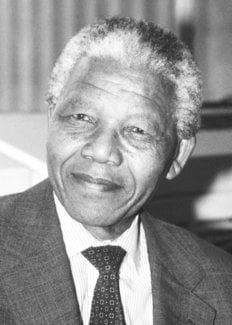
Nelson Rolihlahla Mandela was born in Transkei, South Africa on July 18, 1918 to . His father was Hendry Mphakanyiswa of the Tembu Tribe. Mandela himself was educated at University College of Fort Hare and the University of Witwatersrand where he studied law. He joined the African National Congress in 1944 and was engaged in resistance against the ruling National Party’s apartheid policies after 1948. He went on trial for treason in 1956-1961 and was acquitted in 1961.
After the banning of the ANC in 1960, Nelson Mandela argued for the setting up of a military wing within the ANC. In June 1961, the ANC executive considered his proposal on the use of violent tactics and agreed that those members who wished to involve themselves in Mandela’s campaign would not be stopped from doing so by the ANC. This led to the formation of Umkhonto we Sizwe. Mandela was arrested in 1962 and sentenced to five years’ imprisonment with hard labour. In 1963, when many fellow leaders of the ANC and the Umkhonto we Sizwe were arrested, Mandela was brought to stand trial with them for plotting to overthrow the government by violence. His statement from the dock received considerable international publicity. On June 12, 1964, eight of the accused, including Mandela, were sentenced to life imprisonment. From 1964 to 1982, he was incarcerated at Robben Island Prison, off Cape Town; thereafter, he was at Pollsmoor Prison, nearby on the mainland.
During his years in prison, Nelson Mandela’s reputation grew steadily. He was widely accepted as the most significant black leader in South Africa and became a potent symbol of resistance as the anti-apartheid movement gathered strength. He consistently refused to compromise his political position to obtain his freedom.
Nelson Mandela was released on February 11, 1990. After his release, he plunged himself wholeheartedly into his life’s work, striving to attain the goals he and others had set out almost four decades earlier. In 1991, at the first national conference of the ANC held inside South Africa after the organization had been banned in 1960, Mandela was elected President of the ANC while his lifelong friend and colleague, Oliver Tambo, became the organisation’s National Chairperson.
Africa's Greatest Freedom Symbol
Son of a chief, Nelson Mandela studied law and became one of South Africa's first black lawyers. Early in the 1950s he was elected leader of the youth wing of the ANC (African National Congress) liberation movement. When the country's white minority government prohibited the ANC in 1960, Mandela became convinced that armed struggle was inevitable. Inspired by the guerrilla wars in Algeria and Cuba, he organized a military underground movement that engaged in sabotage. In 1962 he was arrested and sentenced to life imprisonment for high treason and conspiracy against the state.
From 1964 to 1982 he was confined to the notorious prison island Robben Island, together with several other resistance leaders. He was then moved to prison on the mainland until his release in 1990. During his imprisonment, Mandela became a rallying point for South Africa's oppressed, and the world's most famous political prisoner.
Nelson Mandela shared the Peace Prize with the man who had released him, President Frederik Willem de Klerk, because they had agreed on a peaceful transition to majority rule.
President
On 10 May 1994 he was inaugurated as South Africa’s first democratically elected President. On his 80th birthday in 1998 he married Graça Machel, his third wife.
True to his promise, Mandela stepped down in 1999 after one term as President. He continued to work with the Nelson Mandela Children’s Fund he set up in 1995 and established the Nelson Mandela Foundation and The Mandela Rhodes Foundation.
Nelson Mandela never wavered in his devotion to democracy, equality and learning. Despite terrible provocation, he never answered racism with racism. His life is an inspiration to all who are oppressed and deprived; and to all who are opposed to oppression and deprivation.
He died at his home in Johannesburg on 5 December 2013.
1. Nelson Mandela's father died in 1930 when Mandela was 12 and his mother died in 1968 when he was in prison. While the autobiography Long Walk to Freedom says his father died when he was nine, historical evidence shows it must have been later, most likely 1930. In fact, the original Long Walk to Freedom manuscript (written on Robben Island) states the year as 1930, when he was 12.
Comments
Post a Comment